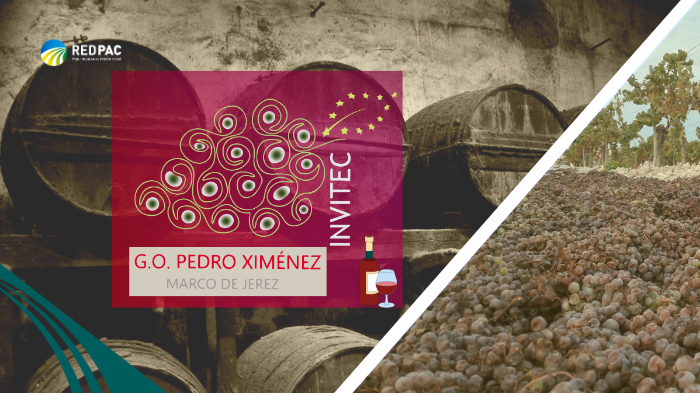
15 de December de 2023
Dinamización rural
Cambio climático y gestión de recursos naturales
The goal is to create a wine industry that supports environmental protection, diversifies production with new organic products, and contributes to job creation and supporting small businesses.
- This Operational Group aims to promote the Pedro Ximénez vine variety through its organic cultivation.
- In addition, it acts to promote the creation of new organic products from this variety and to promote the fight for the environment.
Organic vineyards contribute to mitigating greenhouse gas emissions by 33%, mainly thanks to carbon sequestration in the soil, according to the report "Mediterranean Organic Production and Climate Change: State of Knowledge" by Ecovalia (2018). This means that new wine production and business strategies are increasingly focusing on this production model.
In the Marco de Jerez region , a region between Cádiz and Seville famous for its production of Jerez wine, the use of the Palomino Fino grape has gradually displaced the use of other classic varieties. One of these is the Pedro Ximénez variety, which is becoming increasingly difficult for wineries to access.
To solve this supply problem and contribute to mitigating climate change, the INVITEC Pedro Ximénez Operational Group 'Cultivation of the Pedro Ximénez variety to produce organic sweet wines in the Jerez region ' ( GO INVITEC ) was created, which began its journey in May 2022, and will continue its activities until April 2024.
Goals
The task force's primary objective is to promote the cultivation of the Pedro Ximénez variety in the Jerez region to produce new natural and organic sweet wines . The goal is to create a wine industry that promotes environmental protection, diversifies production with new organic products , and contributes to job creation and supporting small businesses.
The general objective of the project is developed in a series of more specific objectives:
- To characterize the Pedro Ximénez variety in organic farming versus conventional farming.
- Evaluate the influence of organic farming on must composition, as well as establish protocols for sunning and over-ripening organic grapes.
- To produce a pilot-scale, naturally sweet, organic Pedro Ximénez wine, while promoting the organic cultivation of this variety and promoting its wines.
- Promoting development and sustainability through an economic study of organic vineyard management
- Develop a digital guide of best practices for winegrowers in the cultivation of this variety.
Strategy and current status
To successfully achieve the project objectives, GO INVITEC has outlined a series of phases:
- Phase 1 (documentary): Studying vineyard agricultural practices to determine which ones are best suited for the Jerez region and other similar areas through a series of interviews with technicians.
- Phase 2 (field): Experimental activities are carried out through field crop monitoring to subsequently analyze the wine produced. This data will be used to develop a best practices guide.
- Phase 3 (writing the final report): presentation of the results of each action to compile all the project results in a report.
- Phase 4 (Dissemination): Planning and implementing a dissemination and communication plan to inform the sector about innovative results and make the progress made available to them.
Currently, the task force is developing tasks in several phases in parallel. "We are continuing with the final work of the field phase and, at the same time, we are working on compiling the results," the organization told the PAC Network. "In fact, we are beginning to prepare a digital Guide to Good Practices, which we will present at the results presentation sessions we will hold in April."
Partners and financing
GO INVITEC was funded thanks to a grant from the European Union through the European Agricultural Fund for Rural Development ( EAFRD ). The total budget was €297,407.68.
The project partners and their respective budget allocations are the Provincial Council of Cádiz (2,260.50 euros), the Regulatory Council of the DO Jerez.Xérèz-Sherry (6,999.86 euros), the Ecovalia Association (39,317.92 euros), Williams & Humbert (53,025.64 euros) and the University of Cádiz (195,805.76 euros).









